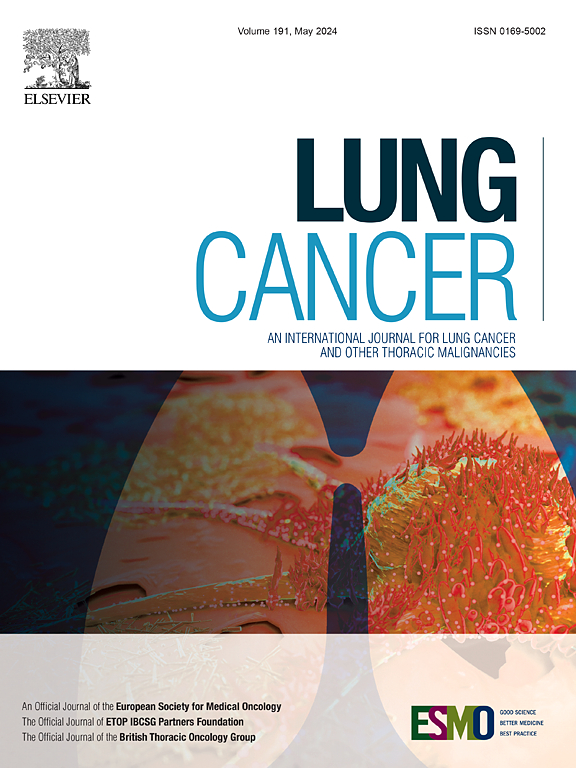盐酸曲美他嗪治疗与肺癌生存:对代谢重编程的影响
IF 4.5
2区 医学
Q1 ONCOLOGY
引用次数: 0
摘要
背景在肺癌细胞中观察到了优先脂肪酸氧化的代谢重新布线。使用曲美他嗪这种抑制脂肪酸氧化的抗心绞痛药物是否会改变患有肺癌的缺血性心脏病(IHD)患者的临床预后尚不清楚。方法我们在全港范围内开展了这项回顾性队列研究,研究对象是香港279894名处方曲美他嗪或长效口服硝酸盐类药物的缺血性心脏病患者(1999年1月至2020年12月,覆盖人口750万)。研究共发现 6561 名原有或新发肺癌患者。结果在 902.9 ± 1410.6 天内,曲美他嗪组的死亡发生率(79.0%,n = 432/547)低于对照组(90.5%,n = 5442/6014,P < 0.001)。Kaplan-Meier 分析显示,使用曲美他嗪可显著提高 IHD 患者的全因死亡率生存率(曲美他嗪:平均生存率 = 1840.6 [95 %CI 1596.0-2085.3] 天,对照组:1056.7 [95 %CI 1011.3-1102.0] 天,Log Rank = 69.4,P <0.001)。Cox 回归显示,在粗略模型(HR = 0.60 [95 %CI: 0.53 to 0.68],P < 0.001)和多变量模型(HR = 0.65 [95 %CI: 0.57 to 0.74],P < 0.001)中,使用曲美他嗪与全因死亡风险的降低显著相关。对已有肺癌的患者进行预先指定的分析也得出了类似的结果(HR = 0.49 [95 %CI: 0.35 to 0.67], P <0.001)。与使用曲美他嗪相关的生存获益主要限于非心血管死亡(P <0.001)。结论使用曲美他嗪与患有肺癌的 IHD 患者总生存率的提高有关,尤其是非心血管死亡。这些发现需要通过随机对照试验加以证实。本文章由计算机程序翻译,如有差异,请以英文原文为准。
Treatment with trimetazidine dihydrochloride and lung cancer survival: Implications on metabolic re-programming
Background
Metabolic re-wiring with preferential fatty acid oxidation has been observed in lung cancer cells. Whether the use of trimetazidine, an anti-anginal agent that inhibits fatty acid oxidation, alters clinical outcomes in ischemic heart disease (IHD) patients with lung cancers is unknown.
Methods
We carried out this territory-wide, retrospective cohort study of 279,894 IHD patients prescribed with trimetazidine or long-acting oral nitrates in Hong Kong (population coverage of 7.5 millions, January 1999 − December 2020). A total of 6561 patients with pre-existing or de novo lung cancers were identified. Clinical outcomes of all-cause mortality were longitudinally compared between lung cancer patients who received trimetazidine (n = 547) versus non-users (control, n = 6014).
Results
Over 902.9 ± 1410.6 days, lower incidence of deaths occurred in the trimetazidine group (79.0 %, n = 432/547) compared to controls (90.5 %, n = 5442/6014, P < 0.001). Kaplan-Meier analyses showed that trimetazidine use was associated with significantly higher survival from all-cause mortality in IHD patients (trimetazidine: mean survival = 1840.6 [95 %CI 1596.0–2085.3], versus control: 1056.7 [95 %CI 1011.3–1102.0] days, Log Rank = 69.4, P < 0.001). Cox regression showed that trimetazidine use was significantly associated with reduced risk of all-cause mortality in crude (HR = 0.60 [95 %CI: 0.53 to 0.68], P < 0.001) and multivariable models (HR = 0.65 [95 % CI: 0.57 to 0.74], P < 0.001). Pre-specified analyses amongst patients with pre-existing lung cancers yielded similar findings (HR = 0.49 [95 %CI: 0.35 to 0.67], P < 0.001). Survival benefits related to trimetazidine use was predominantly restricted to non-cardiovascular mortality (P < 0.001).
Conclusions
Trimetazidine use is associated with higher overall survival in IHD patients with lung cancers, particularly from non-cardiovascular death. These findings need to be confirmed by randomized controlled trials.
求助全文
通过发布文献求助,成功后即可免费获取论文全文。
去求助
来源期刊

Lung Cancer
医学-呼吸系统
CiteScore
9.40
自引率
3.80%
发文量
407
审稿时长
25 days
期刊介绍:
Lung Cancer is an international publication covering the clinical, translational and basic science of malignancies of the lung and chest region.Original research articles, early reports, review articles, editorials and correspondence covering the prevention, epidemiology and etiology, basic biology, pathology, clinical assessment, surgery, chemotherapy, radiotherapy, combined treatment modalities, other treatment modalities and outcomes of lung cancer are welcome.
 求助内容:
求助内容: 应助结果提醒方式:
应助结果提醒方式:


